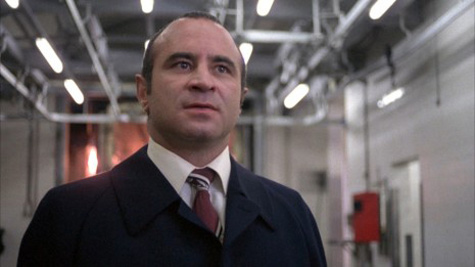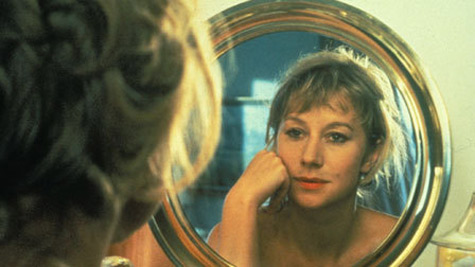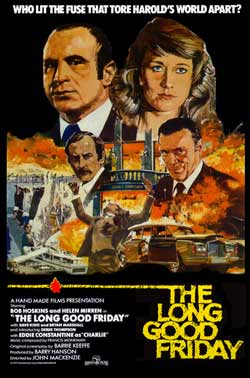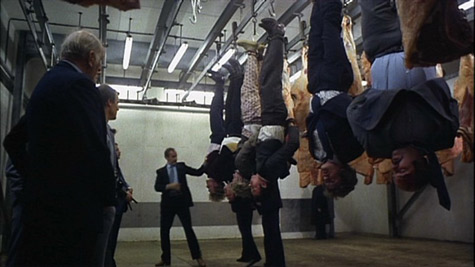
The Americans invented the gangster film, but British film studios have been turning out their contributions to the genre since the 1940s. From the 1947 adaptation of Graham Greene’s novel Brighton Rock through the iconic 1971 Michael Caine vehicle Get Carter to the Guy Ritchie movies and Layer Cake, the Brits have produced gangster pictures with a feel uniquely their own.
In 1980, The Long Good Friday hit British theaters, and I vividly remember seeing it the day it opened in Manhattan two years later. Buzz in the film magazines I read had been good, but I was still surprised by how gripping I found it. To this day, after many viewings, I never get tired of watching it.
We’re in London, circa 1979. Bob Hoskins plays Harold Shand, a criminal kingpin who runs his operation from a houseboat on the Thames. Squat and barrel-chested, his voice a Cockney growl, Harold has an immense energy about him. Everywhere he goes, he moves as if he’s been shot from a cannon. There is no doubt he’s a ruthless sort whose ascent to ruling chief of the London underworld has been bloody. Harold has no rivals, no external threats, and as he himself acknowledges, everyone conceivable who might once have challenged him is now dead.
The result has been a decade of peace in London’s criminal circles, and during this time all the players involved have done well for themselves. Neighborhood chieftains make a good profit and Harold has cops and politicians on his payroll. To complete the picture, he has as his girlfriend the supremely competent Victoria (Helen Mirren), a true partner in his labors. Her polish and apparent upper-class background contrast with his working class brusqueness.

Charlie (Eddie Constantine) is the Mafia honcho Harold and his lady need to impress, and on board his boat, where he puts Charlie up, Harold sets about wooing the American. The irony here is that the Americans, Charlie and his lawyer, are the cautious ones, while British Harold is brimming over with bold, entrepreneurial spirit. In this regard, The Long Good Friday was remarkably prescient: Harold embodies a capitalistic drive that was just then emerging in Britain.
 The 1980s would in fact see the Margaret Thatcher government push private enterprise as never before in Britain, and a massive though controversial development project transformed the real Docklands in the ’80s and ’90s. When Shand talks about bringing the Olympics to London by 1988, one has to credit him with a visionary aspect.
The 1980s would in fact see the Margaret Thatcher government push private enterprise as never before in Britain, and a massive though controversial development project transformed the real Docklands in the ’80s and ’90s. When Shand talks about bringing the Olympics to London by 1988, one has to credit him with a visionary aspect.
Unfortunately, at the moment he’s so close to pulling off his finest achievement, his vision begins to splinter. On the Good Friday he meets the Americans, everything starts to go bad. As his mother is leaving church, somebody tries to kill her with a car bomb. Two of his top lieutenants are killed, and a pub he owns is blown up minutes before he’s about to enter it with Victoria and the two Americans. What the bloody hell is going on?
Classic gangster film structure charts the rise and fall of the protagonist. The Public Enemy with Jimmy Cagney, Little Caesar with Edward G. Robinson, the Paul Muni and Al Pacino versions of Scarface follow this pattern. The Long Good Friday is unusual in that it starts with its main character at the top, radiating power and confidence, and watches his downfall ensue. And the plunge is fast. Before Easter weekend is over, Harold’s world will have crashed around him.
The Long Good Friday was Bob Hoskins’s breakthrough role. He had begun his acting career in 1969 quite by accident. As the story goes, he was waiting at a theater bar for his friend, another actor, to audition for a part. While he was drinking at the bar, someone handed him a script and told him he was next to go onstage. Hoskins went out, auditioned for the role, and got the part. His friend wound up as the understudy.
A dynamic talent, Hoskins is remarkable as Harold Shand. He’s a man who always seems to be struggling to contain his temper. His very smile resembles a wolf baring his fangs, about to devour something. He can’t begin to fathom the reason behind the attacks on his empire, and in his bewilderment he lashes out with brutality. He is convinced that the threat must be coming from the criminal world, a domain he understands. We see him hanging rival gang bosses upside down on meat hooks in an abbatoir, and confronted by possible treachery from his top lieutenant Jeff, with whom he has a warm relationship, he goes berserk, stabbing Jeff several times in the face with a broken bottle.

Yet Shand also has a compelling charm. He is tender and respectful with Victoria. Immediately after slashing a man with a knife to get information, he is outside in the street, joking with kids who accost him for money. “That’s how I started,” he says fondly. At one instant, while in Brixton, he displays a nearly racist contempt for the black population living there; the next instant, he is looking about him at the neighborhood’s run-down conditions saying the residents deserve better. As the destruction of his world engulfs him, we see a side of Harold that is confused, frightened, and vulnerable. He’s a man of roiling contradictions, and this quality combined with the sincerity and scale of his ambition makes his downfall almost tragic.
As Victoria, the great Helen Mirren matches Hoskins step for step. Word has it that she demanded thorough rewrites for her character, and it makes sense that she would. Victoria is no mere eye candy moll simmering in the background of scenes. Harold’s equal, she works beside him on the throne, negotiating with the Americans, thinking on her feet to try to keep the deal afloat while all goes haywire. She’s intelligent and attractive, and she is the only one who can calm Harold down when he goes ballistic. At one point after he explodes, she grabs him in a wrestling clinch and stares him in the eye till he regains his senses. There is never any question of betrayal between these two, and if Harold is going to go down at the end, you know that Victoria will be there with him.
Directed by Brit veteran John Mackenzie and written by Barrie Keeffe, The Long Good Friday moves briskly from start to finish. Its momentum never flags. Bolstered by a vibrant Francis Monkman score, it approaches the core of its plot through an opening mosaic of jigsaw-like scenes, but by the end of the movie the pieces come together and all is explained.
It also has an undercurrent of dark humor throughout, not the least of which is its use of Easter as the time frame. As critic Michael Sragow says, Shand’s “call for a ‘new London’ wickedly echoes the Christian call for a ‘new Jerusalem’ … There’s a shocking, blasphemous edge to the imagery, even when it doesn’t involve a car being blown up in a church courtyard or a security guard’s hands being nailed to the floor.” Indeed, one can’t help but think of inverse crucifixions when Shand hangs his gangland rivals from the meat hooks in the slaughterhouse.
As so often happens in the film world, The Long Good Friday followed a tortuous route to the screen. Financed at first by Black Lion Films, a company owned by media mogul Lew Grade, the film almost fell prey to savage cuts. The reason: when Grade saw the finished product, he disliked the part of the plot involving the Irish Republican Army. He had the movie chopped from 114 minutes to 75 minutes and planned to show the butchered version on television. Producer Barry Hanson called this print “literal nonsense.” Ultimately though, before the dreaded TV screening, Handmade Films bought the rights to the film (Handmade was co-owned by George Harrison; yes, that George Harrison), and the film was released in its intended form. Acquired for next to nothing, it made Handmade a nice profit.
Violent, funny, and exciting—The Long Good Friday is all these things. It stands now as a definite classic of British gangster cinema. Harold Shand’s long fall in a single weekend has a Shakespearean dimension to it; he’s an almost-great man brought low. And when he reaches his end, trust me, it will be worthy of his stature. The final shot, an extended close-up…You’ll never forget the play of emotions flitting across Harold Shand’s face.
Scott Adlerberg lives in New York City. A film nut as well as a writer, he co-hosts the Word for Word Reel Talks film commentary series each summer at the HBO Bryant Park Summer Film Festival in Manhattan. He blogs about books, movies, and writing at Scott Adlerberg’s Mysterious Island. His Martinique-set crime novel, Spiders and Flies, is available now from Harvard Square editions.
Read all posts by Scott Adlerberg for Criminal Element.
